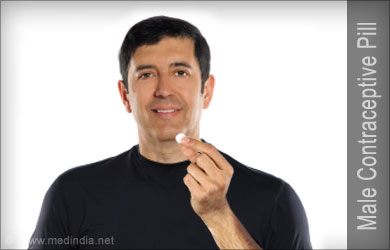- Male Contraception Research - (http://www.pamf.org/teen/sex/birthcontrol /malecontraceptive.html)
About
‘A birth control pill for men, that's fair. It makes more sense to take the bullets out of the gun than to wear a bulletproof vest’, rightly says the American stand-up comedian, Greg Travis.
Male contraceptives are birth control methods to prevent pregnancy that mainly affect the male physiology.

Birth Control Methods
When one looks at the contraceptive choices available in the market, the balance is tilted in favor of women. Condoms and vasectomy are the two most common methods of contraception available for men at present. Another method is the coitus interruptus, where the man withdraws his penis out of the vagina before ejaculation.
Condoms - There are various types of condoms but rubber condoms are the most popular ones as they have a dual purpose of preventing sexually transmitted diseases and acting as a contraceptive. At present, latex condoms and polyurethane condoms are available in the market.

Side effects: They have their disadvantages too, some of them being-
- Possibility of condom breakage, slippage or incorrect use.
- Latex allergies
- Decrease in sexual pleasure in some men.
Vasectomy - Another male contraceptive option is vasectomy, which is a safe and simple surgical procedure to prevent the release of sperm during ejaculation, wherein the vasa deferentia (the muscular tubes connecting the testicles to the urethra) are clamped or sealed. This way the sperm does not mix with semen during ejaculation from the penis.Side effects: Unlike condom, vasectomy does not protect against HIV. Secondly, although it is not exactly permanent, the reversibility of procedure is not always successful, especially as reversibility rates come down with the time elapsed from the procedure.

Studies and trials are being carried out all over the world in the hope of developing safe and effective birth control pills for men. Research is being done in both areas – the hormonal as well as non-hormonal contraceptives and they are mainly focused on three approaches:
- Keeping the male from producing the sperm through hormonal contraception.
- Inhibiting sperm motility.
- Preventing the sperm from fertilizing an egg.
Despite innumerous research since the last four decades, ‘a pharmacologic approach to male contraception remains a longstanding challenge’, feel the scientists. Let’s take a look at some of these birth control methods and pills.
Hormonal Birth Control for Men
The hormone testosterone triggers the formation of new sperm cells in the testicles. So, hormonal contraceptives could temporarily block the effects of testosterone so that testicles stop producing healthy sperm cells.
However, this needs to be achieved without lowering testosterone levels to such an extent that it triggers side effects, such as a loss of sexual desire.
Testosterone Progesterone Combination Therapy
This combination therapy developed jointly by scientists at CONRAD and WHO used the combination of a progestin called norethisterone enantate (NET-EN), and an androgen called testosterone undecanoate (TU) to suppress formation of new sperm cells. This was considered a superior male contraceptive because of the fact that progestins can inhibit gonadotropin secretion from the pituitary glands.
The trial was however discontinued by the WHO review panel based on their determination that the risks of possible side effects may outweigh the potential benefits to the male study participants.
Side effects: The combination had the usual side effects of male hormonal contraceptives such as acne, increased libido, injection site pain, weight gain, and depression and mood changes, but most of the side effects were reported at a higher frequency than anticipated for this combination.

Non-hormonal Birth Control for Men
The lack of success with hormonal contraceptives has made scientists shift their focus from hormonal to non-hormonal strategies. Non-hormonal methods include techniques other than hormones that prevent the healthy sperm from entering a woman's vagina. Unfortunately, most of them are still in the developmental stage. These work by:
a) Blocking the vas deferens
As an alternative to vasectomy, a no-scalpel technique of injecting a polymer of styrene maleic anhydride (SMA) complexed with the solvent dimethylsulfoxide into the vasa deferentia has been developed by researchers in India. Termed as Reversible Inhibition of Sperm under Guidance (RISUG), the polymer partially blocks the vas deferens. It has almost no side effects, provides effective contraception and is reversible.
Disadvantages: Data on RISUG reversibility is based on animal experiments. So it is not yet confirmed whether reversing it in humans would restore male fertility. Secondly, it would be difficult to generate the kind of profits that would attract the attention of a pharmaceutical company, since it is inexpensive and one injection will work for years.
b) Blocking CatSper and Slo3 Channels
Researchers from the Institute of Biotechnology and the Institute of Cellular Physiology, both in Mexico, are in the process of developing a reversible, non-hormonal, male contraceptive which does not generate side effects. They are looking for specific molecules that would suppress the action of CatSper and Slo3 channels and thus achieve reversible infertility in men.
Cation channels (CatSper) play a role in regulating the entry of calcium atoms into sperm cells. Calcium cations help the sperm to push through the membrane of the egg cell during fertilization.
Similarly, SLO3 is the potassium channel that affects the motility and subsequently the fertilization of the egg.
''Specificity is the key feature that should have a drug to minimize side effects on health. If it is a molecule that specifically inhibits a protein that performs an essential role in a cell and is found only in that cell type, the drug will have no effect on other cell types. This is the case of ion channels and Slo3 CatSper,'' said lead researcher Alberto Darszon Israel.
Disadvantages: None found so far.
c) Disrupting Sperm Maturation
Dolores Mruk and Chuen-yan Cheng, scientists at the Population Council in New York, have shown that the chemical Adjudin causes reversible infertility in animals by inducing the release of immature sperm cells. The new drug disrupts the process of sperm maturation in the testes. It does not however affect testosterone production.
Adjudin is an analogue of an old drug known as lonidamine, an anti-cancer medication whose contraceptive effect was discovered in the 1980s. Researchers did not pursue lonidamine as a male contraceptive because at high doses it caused kidney damage.
Side effects: The drug is not yet available commercially, and also, researchers are still conducting safety and efficacy studies.
d) 'Dry Orgasm' Pill
Drs. Nnaemeka Amobi and Christopher Smith, at King’s College London, discovered that a high blood pressure medication phenoxybenzamine, and a discontinued schizophrenia medication thioridazine, could each act as a male contraceptive. They found that these two drugs disrupted the transport of sperm by changing the way the smooth muscles of the vas deferens behaved during an orgasm. However, thiordazine had extreme side effects and had to be discontinued. Phenoxybenzamine (PBZ), on the other hand, shows promise as a male contraceptive pill. Administered in doses up to 20 mg/day, PBZ blocks ejaculation in 2 to 3 days time. The advantages of this drug are-
- It does not change the hormonal balance of the body.
- It does not affect blood pressure in the dose prescribed for contraception.
- Ejaculation is fully reversed with the cessation of treatment.

Side effects: PBZ, however, has the side effects ranging from dizziness to a fast heartbeat to a stuffy nose.
There may be set backs and blocks, but scientists are hopeful about developing a safe and effective male birth control pill very soon.





